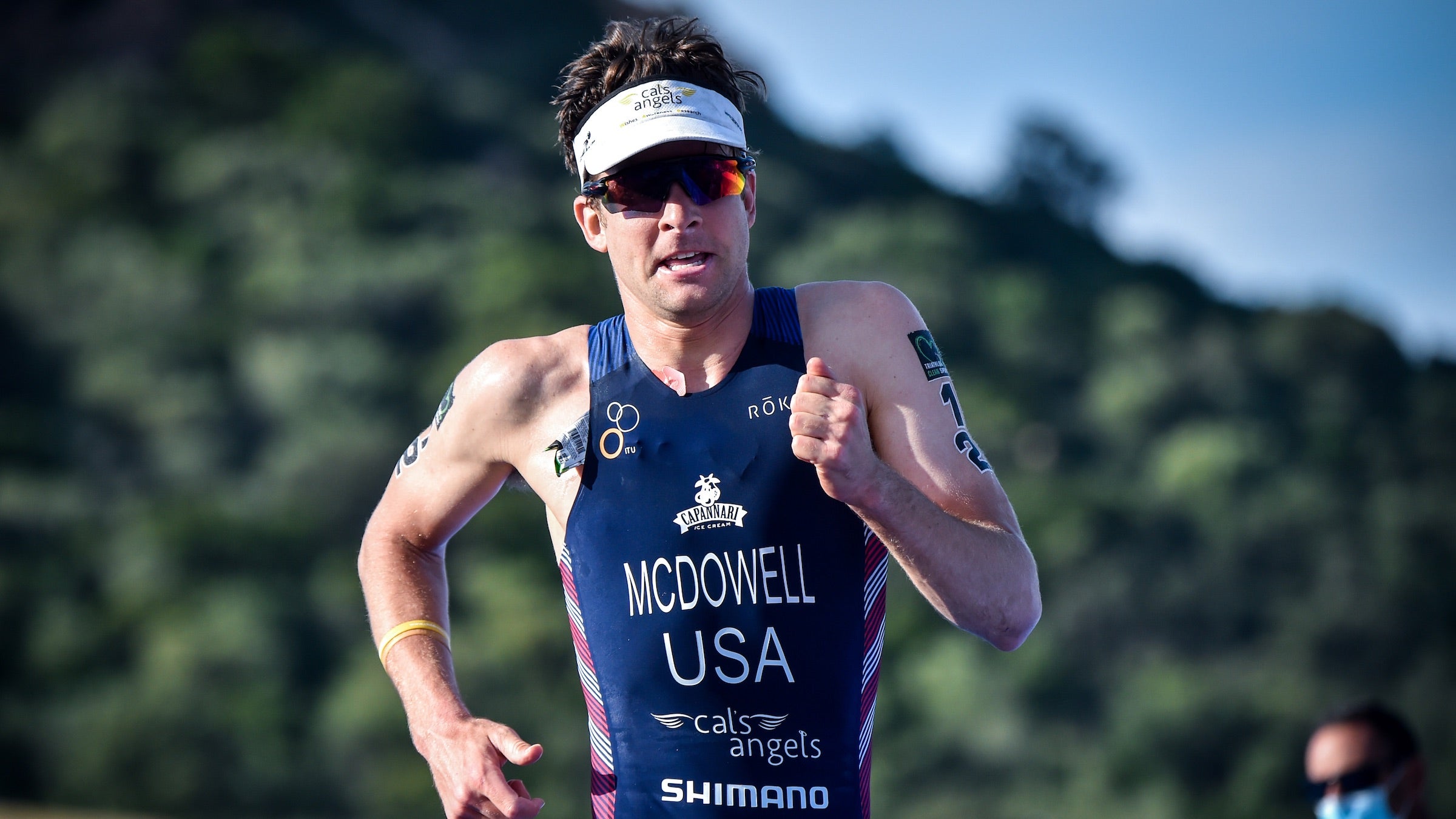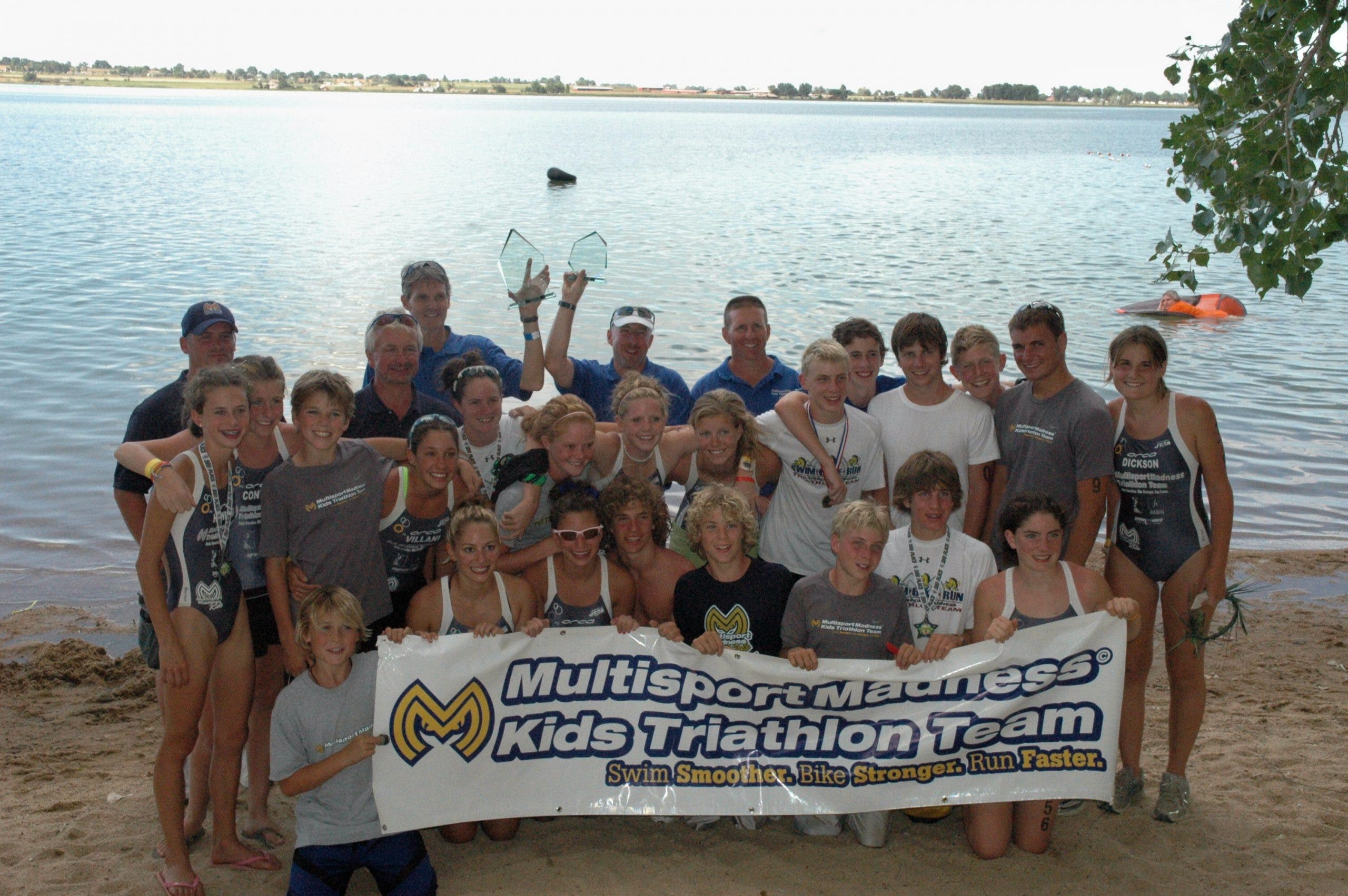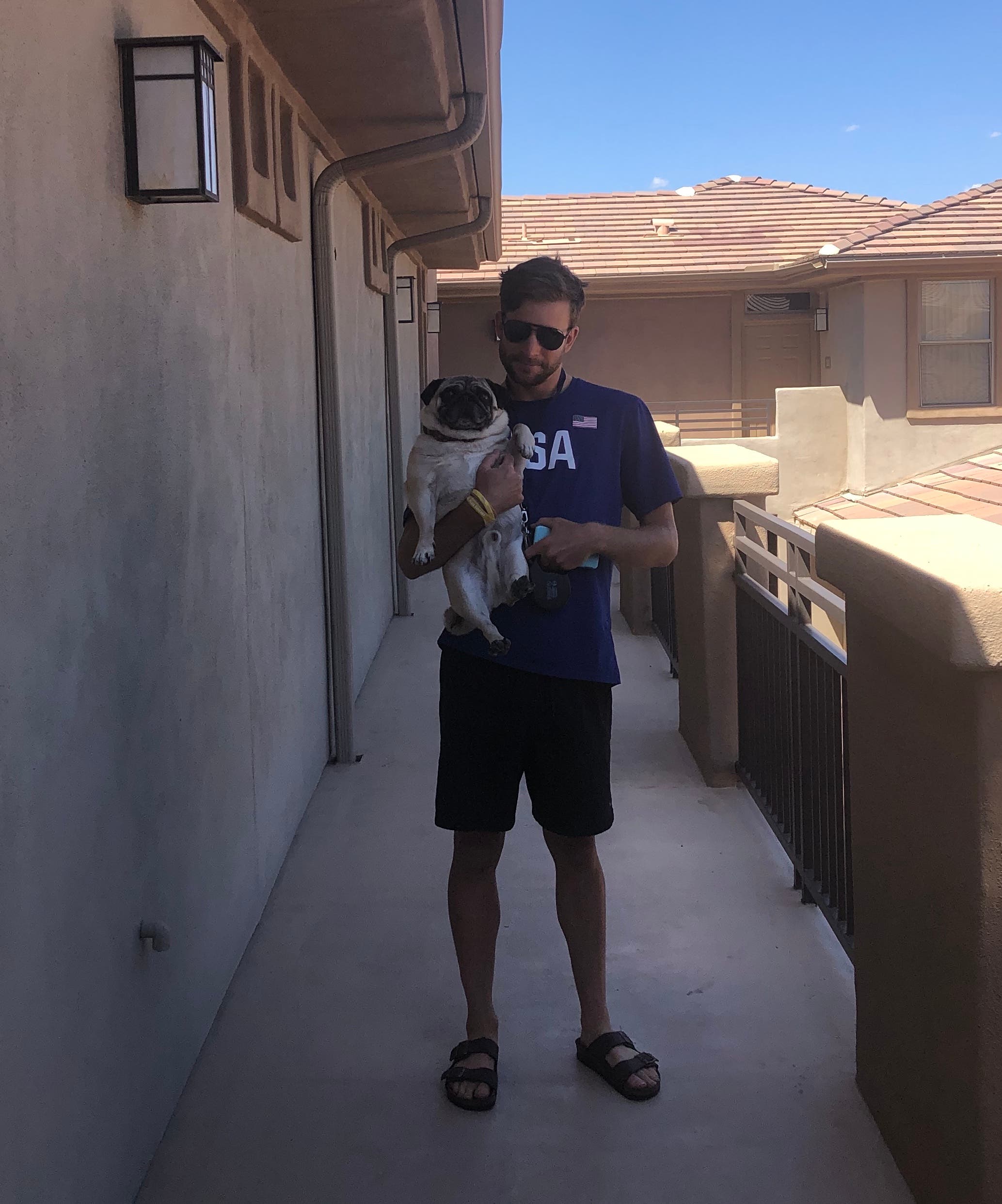8 Things You Should Know About Cancer Survivor and Olympian Kevin McDowell

Kevin McDowell racing in Arazchena (Photo: Janos Schmidt/World Triathlon)
When Team USA announced the 2021 Olympic squad for triathlon a few weeks back, perhaps no one was more relieved than Kevin McDowell. “I was quietly confident about my chances, but the experience had been such a roller coaster, I just didn’t know,” he said after the selection. “When I heard, I couldn’t hold the tears back. It’s been such a journey.”
Indeed, McDowell’s triathlon journey has been less than linear. While he has more experience than all of the American athletes on the World Triathlon Championship Series (WTCS) circuit, a Hodgkin’s Lymphoma diagnosis at 18 derailed his career—and threatened his life. Once he finished the intense chemo treatment and was deemed cancer-free in 2011, McDowell dove right back into the sport. But he faced a lengthy uphill battle as his embattled body (and mind) readjusted to the rigors of training at a world-class level.
Now 28, McDowell is finally hitting his stride. He had some standout performances in May at the World Cup race in Huatulco, Mexico (6th) and in June at the WTCS race in Yokohama (11th), and played a pivotal role in Team USA’s second-place finish in the mixed relay event at the 2020 World Championships in Hamburg, which helped to secure his Olympic spot. In Tokyo, he’s confident the American mixed relay squad can level up to gold. As for his individual event? He’s ready to have the race of his life. “My mindset has shifted for the better recently,” he said. “I am in a rhythm now where I feel like I can really believe in myself going into races.”
Here are some things know about this inspiring new Olympian.

He’s been racing since he was 10.
McDowell was one of the original members of Multisport Madness, a youth elite team based outside of Chicago. His prolific racing resume dates back to 2008, and includes highlights like a silver medal at the 2010 Singapore Youth Olympic Games, third at the 2010 ITU Junior World Championship Finals in Budapest, while he was still a teenager. It was actually his childhood best friend (and 2016 Olympian) Ben Kanute who really drew him into the sport as a kid, and the two of them had an intense-but-fun rivalry as they rose through the rankings (and also while trick-or-treating together as teens). “We met at 10, went to middle school together, and now here we are still racing,” said McDowell, who was in Kanute’s 2020 wedding. “The kids’ team ignited that passion I have for the sport. I never wanted to miss a practice. We just had the best time.”
He’s bulkier—and taller—than ever before.
McDowell’s not exactly sure why, but he thinks chemo caused a delay in puberty, leading to a growth spurt at the ripe age of 26. “I got back into elite competition so quickly after chemo that I never let my body fully regain its strength and get its hormonal balance to what it was before,” he said. “When I finally got things under control, years later, my body caught up.” Now, he stands at a solid six feet (close to an inch taller than he was a few years ago) and put on several pounds of muscle mass. “It was a tough adjustment to go through as my body grew and changed, but ultimately, it helped me as an athlete,” he said.
He’s learned from coming back too quickly post-cancer.
McDowell is quick to admit he didn’t approach his post-cancer comeback in the smartest way. Only 19, he was eager to jump back into training and racing and catch up to his competitors. He returned to college and to the sport just weeks after his final round of chemo. “To be honest, Lance Armstrong gave me false hope,” he said of his one-time hero. “I thought I could do the same as he did post-cancer. And then we learned he was taking a lot of testosterone and steroids, which helped him recover right away. I wasn’t doing that and it took me so much longer to catch back up. Everything was so out of whack.”
In retrospect, McDowell feels like he should have scaled back on the intensity of training to give his body time to rest and rebalance. “My doctor advised against going right back to school and into triathlon, but I didn’t want to hear that,” he said. “There’s no right or wrong way to handle the situation, but I did have to learn things the hard way.”
He almost quit triathlon three times.
There were three very vivid occasions where McDowell was ready to give up on the sport. “In 2013, I went to the folks at USA Triathlon and said, ‘I just can’t do this anymore.’ My body was breaking, emotionally, I was a wreck. They told me to stop competing and just focus on school,” he recalled. That allowed McDowell a physical and emotional re-set to the point where he felt like he could return to competition. But he still wasn’t 100%. When he missed making the Olympic team in 2016, he reached another low point and was unsure of his ability to endure another Olympic quad. “At that point, my friends were moving on in life, getting real jobs, and I questioned if I should move on, too,” he said.
Convinced by his family to give it four more years, he then suffered from anemia and injuries in 2018 and early 2019, which caused him to nearly throw in the towel again. Hiring sports dietitian Liz Fusco and focusing on his nutrition helped him turn the corner, allowing him to press on for a solid push towards Tokyo. “I’ve finally accepted that I’m different from other triathletes. I’ve been through a lot, my body just doesn’t operate the same way as others, and I have to train differently,” he said. “It took me nine years to figure that out, and I’m still learning.”

He loves pugs.
McDowell is unabashedly obsessed with pugs, including his nine-year-old “best bud,” Champ. “I’m the type of person that when I see a pug when I’m running, I’ll stop and beeline my way over to it, unless I’m in a hard interval,” he said. “I always say, it’s a good omen when I see one before a race.” When McDowell is not training, he’s usually hanging out with Champ, who is currently camping out at his parent’s house in Colorado Springs as he travels for training and racing.
He has an ice cream sponsorship.
For several years, McDowell has had a partnership with Mount Prospect, Illinois-based Capannari Ice Cream, which is owned by family friends. In 2017, Capannaris released a carrot cake-flavored ice cream in McDowell’s honor, aptly named “Raisin the Flag,” which McDowell served up in scoops at the shop. (They also regularly ship him pints to his home in Colorado Springs.) Recently, Capannaris has sold a special “Flight to Tokyo” sundae in honor of McDowell’s triumph.
He challenges waiters to bring him the spiciest food they have.
McDowell may love ice cream, but he just as happily devours spicy food. “The chemo dulled my taste buds a bit, so I’m not as sensitive to the heat of most spicy foods,” he said. He often challenges waiters at restaurants to bring him the spiciest item on their menu. “It’s kind of my hidden talent. I’ve had next level peppers in Mexico and the hottest wasabi I’ve ever tasted in China,” he said. “I try anything and everything wherever I travel.”
He gives back to the cancer community.
Aside from the athletic accolades, McDowell is most proud of his relationships with fellow cancer survivors and those currently battling the disease. “It took a while, but I am finally comfortable sharing my story. I want to show that you can make it through. ” Last year, McDowell began posting pieces of his cancer journey each Sunday on Instagram, opening up a larger dialogue with his followers around the world. He also works with Cal’s Angels, a St. Charles, Illinois pediatric cancer foundation, and recently hosted a pop-up sale for “Team Kevin” t-shirts, which raised $4,500 for the charity. “I want to use that money to throw an Olympic-themed party for the kids on the cancer floor at Lurie Children’s Hospital in Chicago this fall,” shared McDowell. “It is just so special and means so much for me to give back, the way people gave to me when I was sick.”